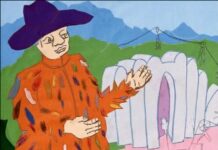
Ebook Info
- Published: 1992
- Number of pages: 368 pages
- Format: PDF
- File Size: 2.34 MB
- Authors: Voltaire
Description
Candide is the story of a gentle man who, though pummeled and slapped in every direction by fate, clings desperately to the belief that he lives in “the best of all possible worlds.” On the surface a witty, bantering tale, this eighteenth-century classic is actually a savage, satiric thrust at the philosophical optimism that proclaims that all disaster and human suffering is part of a benevolent cosmic plan. Fast, funny, often outrageous, the French philosopher’s immortal narrative takes Candide around the world to discover that — contrary to the teachings of his distinguished tutor Dr. Pangloss — all is not always for the best. Alive with wit, brilliance, and graceful storytelling, Candide has become Voltaire’s most celebrated work.
User’s Reviews
Editorial Reviews: Review “When we observe such things as the recrudescence of fundamentalism in the United States, the horrors of religious fanaticism in the Middle East, the appalling danger which the stubbornness of political intolerance presents to the whole world, we must surely conclude that we can still profit by the example of lucidity, the acumen, the intellectual honesty and the moral courage of Voltaire.”—A. J. Ayer From the Inside Flap “Candide is the story of a gentle man who, though pummeled and slapped in every direction by fate, clings desperately to the belief that he lives in “the best of all possible worlds.” On the surface a witty, bantering tale, this eighteenth-century classic is actually a savage, satiric thrust at the philosophical optimism that proclaims that all disaster and human suffering is part of a benevolent cosmic plan. Fast, funny, often outrageous, the French philosopher’s immortal narrative takes Candide around the world to discover that — contrary to the teachings of his distringuished tutor Dr. Pangloss — all is not always for the best. Alive with wit, brilliance, and graceful storytelling, “Candide has become Voltaire’s most celebrated work. “From the Paperback edition. From the Back Cover The spirit of satire flourished during the Enlightenment as in no other period, and the crowning achievement of that caustic, brilliantly learned age was Voltaire’s Candide, published in 1759, at the height of its author’s enormous European fame. Following the worldwide encounters – with shipwrecks, earthquakes, pestilence, and human insanity – of its hero and his incomparably absurd tutor, Dr. Pangloss, Candide is the most entertaining of all philosophical novels and the most philosophical of entertainments. About the Author Voltaire (François-Marie Arouet) (1694—1778) was one of the key thinkers of the European Enlightenment. Of his many works, Candideremains the most popular. Read more
Reviews from Amazon users which were colected at the time this book was published on the website:
⭐This is an insanely rich story plot that includes many characters and adventures, in multiple countries across 3 continents, including one secret road to a hidden fabled city. It involves love, murder, chase scenes, perilous sea journeys and even a canibalistic tribe, and exposes the contrast between comfort and discomfort, riches and bankruptcy, freedom and slavery, beauty and ugliness, about trust from a stranger and betrayal by the most unexpected, and colourful friendships and enemies made along the journey.It is a story set in a chaotic world filled with civil and religious wars, blatant prejudice, racism, slavery, despotic rulers, plague, sexual diseases, cruel capital punishment of innocent victims, just like it was in 1759 when the book was written. And the best part is? It is less than 180 pages, although I swear it feels much longer due to the magnanimity of the story. It’s astonishing how Voltaire could possibly wrote all of this in just 3 days.With the attempt of not spoiling too much of the narrative, let me just say that the plot begins with a calm and friendly environment just like the situation with the Starks at the first episode of the Game of Thrones. The plot then progressed into a wild mix of Les Miserables + Around the World in 80 Days, with one distinctive philosophical question that has since entered the English language dictionary: Panglossian.Pangloss was a mentor for Candide, and he taught Candide that he lived in “the best of all possible worlds,” and that “since everything is made for an end, everything is necessary for the best end.” But then the tremendously rich life journey that Candide eventually had, prove otherwise. That people are cruel and life is not fair, that the world was “very mad and very abominable”, according to an anti-Panglossian character named Martin (an eternally pessimistic person). And slowly but sure Candide begins to question Pangloss’ naive optimistic view on life, where he eventually said “it is the madness of maintaining that everything is right when it is wrong.”But is it really naive? Over the development of the story we witness the philosophical interpretation about the nature of suffering, where Pangloss himself argued that all unfortunate events eventually led to somewhere more desirable and thus the suffering is a crucial stepping stone towards something more optimistic, a strength that can only be obtained through overcoming obstacles. Moreover, as the book makes it painfully obvious, it was not blind optimism but his naive judgements towards people’s intentions that led Candide into troubles. And so, being optimistic is one thing but risk management is another one, and we cannot blame optimism for the sorrow that comes from our poor risk management.This, obviously, is not a definitive interpretation and this “Panglossian Dilemma” is what makes this book one of the most influential contributors to the Age of Enlightenment in France. It forces us to think and it is still open for a debate even today some 200+ years later.And the conclusion that I get from what Voltaire is trying to say in this book is that we cannot be happy – even if we’re literally living in a paradise with all the riches – if we cannot spend it with the ones we love. All the luxuries and the beauty that we own will mean nothing if we can’t appreciate it, in fact it could become a burden of misery to us (just like the senator in Venice). And perhaps more importantly, in real life there is no distinctive black and white, as even a kind good natured person can kill few people under precarious circumstances, or we can still choose to be kind despite the awful things that happened to us (like the old lady).Indeed, people are incapable of fully understanding the evil in this world and life can be cruel, but at the same time we also tend to forget that suffering is optional and temporary. So, in the end our happiness or misery really depends on our outlook in life: we can still able to be an eternal optimist even under the worst possible circumstances, or we can be miserable even when surrounded by all the goodness life has to offer. And all of these deep philosophical thoughts are illustrated in the most imaginative way possible by Voltaire. Incredible, incredible book.
⭐During the early years of Saturday Night Live, Gilda Radner would often appear during the Weekend Update segment as Roseanne Roseannadanna who would respond to a letter from Mr. Richard Feder from Fort Lee, New Jersey. At the end of her segment, she would say to the Weekend Update host, Jane Curtin, something like the following.”Well, Jane, it just goes to show you, it’s always something! If it’s not one thing, it’s another! Either you’re depressed at Christmas or you got toilet paper hangin’ from your shoe!”For Candide, it isn’t one thing or another; it is one thing after another. He enjoys life in a castle with a Baron’s family. His tutor, Pangloss, teaches Candide the philosophy that all is for the best. Candide’s life teaches him otherwise, but he continues to believe what Pangloss told him. After Candide kisses the hand of the Baron’s daughter, Lady Cunegonde, he is literally kicked out of the castle. Then, after being penniless and dying of hunger, he is rescued by two men in blue who say that Candide is a well built young man who is just the right height. They put him into the army of the Bulgars. After taking a walk one day, he is given his choice of punishments. He eventually escapes but then runs into another problem. This is the life of Candide throughout the book. He is up and then down and then up and then down and so on. Poor Candide has more ups and downs than a rollercoaster!Voltaire wrote Candide as a satire. It isn’t a straightforward adventure novel. You can tell that from the absurdity of situations. In Candide, Voltaire attacked the doctrine of philosophic optimism. Also, Voltaire’s dislike or contempt or generally bad opinion of religious figures is obvious from the writing. Voltaire’s other experiences in life are reflected in the book. You can get some of the context from the fourteen notes at the back of the book. However, it is helpful to read a study guide concurrently with the novel. I chose Cliff’s Notes but there are others which you can choose. I actually found an error in Cliff’s Notes. In one chapter, while Candide is on a French ship, he sees two other ships engaged in battle. In the novel, it says they are Dutch and German ships. Cliff’s Notes indicates that one of those two other ships is French. Actually, the French ship is the ship on which Candide is traveling.The music for various stage performances can sometimes be described by a single word. For one military oriented work, I think of the word “majestic.” For a ballet like Sleeping Beauty with dancers flowing across the stage, I think of the word “romantic” or “sweeping.” The overture of the operetta Candide, based on the novel and with music composed by Leonard Bernstein, makes me think of the word “frantic.” That is how the life of Candide seems to me — frantic.I can’t read French, so, like most people, I read a translation of Candide. A little research showed that there are variations in words and phrases in different editions of the book. I suppose that is inevitable when a book is originally written in a language other than English. At the beginning of the Bantam Classic edition is “The Sage of Ferney: An Appreciation” by André Maurois. Ferney is the retreat where Voltaire spent his old age. This introductory section was very informative. Other editions probably have different scholarly material. Whatever edition you choose to read, I think that you will enjoy the novel Candide.
⭐….were, I am sure, words used about “Candide” when it was first published.Candide is a naïve, gullible, quixotic innocent, who is launched on a fantastical journey around Europe, South America and returning to the Eastern Mediterranean, in his search for his true love, Cunegonde, and answers to the philosophical questions raised by his mentor, Pangloss.He suffers disaster after disaster and is mistreated, cheated and betrayed time after time but just keeps bouncing back.The story is written in a light, humorous style, with echoes of Gabriel García Marquez’s magic realism; with an overlying cynicism it is used to lampoon and satirise the venality of the establishment, particularly the Roman Catholic Church.It is an easy and very good read and it just flows along; it is hard to imagine that it was written more than 250 years ago, although at least some of the credit for this may be down to skilful translating and editing.One passage really caught my eye – writing in 1759, Voltaire has Martin saying: “It is said [of] Venice….that strangers meet with a very good reception if they have a good deal of money.” – just a few weeks ago, in late 2017, in response to a Brit who complained about being stuffed with a bill for EUR 526 for lunch for him and his parents, Luigi Brugnaro, the Mayor of Venice, called him a cheapskate and said: “If you come to Venice, you need to shell out a bit. You’re welcome, but you need to spend.” – plus ça change….
⭐This Kindle version of Candide is very disappointing in the translation, which seems to have been done from the original French solely through the medium of an automated translation system, and has not bee checked or edited since then. Much of the text is in consequence gibberish, often using modern-day americanisms such as ‘ebook’, ‘motorway’, ‘U.S.of A.’ and ‘guys’ among many others – certainly terms which were not in contemporary English usage in Voltaire’s time! Other phrases require careful study in order to make sense of what is otherwise gibberish e.g. ‘My pricey Martin..’ should presumably be ‘My dear Martin..’ and so on.
⭐”Those who make you believe absurdities can also make you commit atrocities”. Voltaire said that and his dictum seems to run to the core of Pangloss’s optimistic belief in this, “the best of all possible worlds.” Candide’s ingenuousness turns him into a flimsy protagonist at times and, like the raging torrent that rushes him down a river outside El Dorado, he is simply at the effete end of a flawed quietism. Voltaire exposes Pangloss’s all-smiles view of the world when he justifies the drowning of the monk Jacques off Portugal on the grounds that the sea was made for that purpose. The relationship between Martin and Candide is based on often irate debate and difficult self-questioning, something Voltaire adopted in his diatribes against all forms of religious propaganda and corrupt clericalism. Something of a fairy tale here, but with a robust, subversive challenge to power freaks everywhere.
⭐So. One finally catches up with Candide, the 84-page novella dashed off by Voltaire in three days and recognised as one of the most influential books ever written. It is the story of a young man who is persuaded of the doctrine of optimism by his mentor Professor Pangloss: “All is for the best in the best of all possible worlds”.This is a strange dark fairy tale riddled with allegory and overburdened with an exaggerated, almost cartoonish brutality. Also cartoon-like is the resurrection of bumped-off characters, however welcome their return. (I’m looking at you, Pangloss.) Less welcome was the undercurrent of antisemitism I detected in certain parts of this story. (Et tu, Voltaire?)It is only really possible to understand Voltaire’s great work as a satire of its times thanks to the rather odd but undoubtedly helpful footnotes. (I am referring to the Amazon Classics edition with Philip Littell’s introduction – one of the most bizarre pieces of writing I have ever read. Or, to be more precise, skipped.)I close with my favourite quote: “Fools admire everything in an author of reputation. For my part, I read only to please myself. I like only that which serves my purpose.” Quite so. And now the sun has come out and I must cultivate my garden.
⭐This is an adventure story with terrifying and shocking atrocities.The Baron chucks Candide out of his home after he catches him kissing his daughter. Candide ends up in the army but manages to escape and goes to Holland. The adventure continues as he travels to Lisbon, Buenos Aires, Eldorado, Paris, Venice and Constantinople. He gets flogged, robbed and commits murder.The story is too overwhelming for me. So many horrible things happen, it’s exhausting. However, it’s a gripping journey and not short of excitement and adventure. It has philosophical aspects to it but that goes over my head. I am just interested in a good story.It’s a quick read and you could read it in one sitting.In conclusion I am giving it 3 stars for lots of excitement but too much brutality.
Keywords
Free Download Candide and Other Stories: Introduced by Roger Pearson (Everyman’s Library Classics Series) in PDF format
Candide and Other Stories: Introduced by Roger Pearson (Everyman’s Library Classics Series) PDF Free Download
Download Candide and Other Stories: Introduced by Roger Pearson (Everyman’s Library Classics Series) 1992 PDF Free
Candide and Other Stories: Introduced by Roger Pearson (Everyman’s Library Classics Series) 1992 PDF Free Download
Download Candide and Other Stories: Introduced by Roger Pearson (Everyman’s Library Classics Series) PDF
Free Download Ebook Candide and Other Stories: Introduced by Roger Pearson (Everyman’s Library Classics Series)




